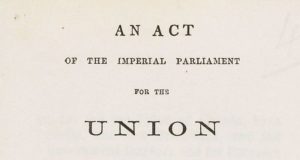Over on Professor Daly’s blog Administrative Law Matters, Professor Audrey Macklin wrote what I would characterize as a confessional: an admission that the law of judicial review in Canada may be beyond repair. What Prof. Macklin proposes, in light of this realization, is a renewed focus on the principles of statutory interpretation, rather than a myopic focus on standard of review categories—a parochical Canadian invention. Prof. Macklin specifically argues that our disagreements should focus on “what ought to count in statutory interpretation, why it ought to count, and how it ought to count.” For Professor Macklin, external considerations such as access to justice and international law should inform statutory interpretation.
I agree with Professor Macklin—to an extent. I see Macklin as making two claims: (1) the rules of statutory interpretation should be used to replace the rigid categories of standard of review and (2) that the rules of statutory interpretation can be massaged to take account of “normative, policy, operational, and other considerations.” The first contention, I think, is desirable. The second, I worry, will lead to more uncertainty, asking judicial review courts to do more than they are designed to do.
Let’s take (1) first. On this front, Professor Macklin finds agreement with many existing allies. Advocates for the Rule of Law, in its submissions before the Court in Vavilov and Bell/NFL, basically made this very point. With submissions expertly argued by Adam Goldenberg, ARL asserted that the Court, in its attempts to simplify the standard of review, had actually made things worse. Instead, ARL argued that the “established tools of statutory interpretation” should be used in a three-step framework to determine the level of deference. First, courts should look to judicial constating legislation to determine the level of deference; explicit direction that exists, for example, in the Federal Courts Act (which, it should be said, was ignored by the Court in Khosa). Second, the decision-maker’s home statute may contain explicit or implicit legislative direction on the standard of review. A statutory provision allowing a decision-maker to grant licences “in the public interest,” if supported by relevant context and purpose, should allow more deference. Finally, courts should look to the specific textual provision under which the decision-maker made her decision. If not contradicted by context, (say, a statutory right of appeal), broad language in this respect should also mean deference.
This strikes me as a good way to proceed. I make similar arguments in a paper to be released in the Western Journal of Legal Studies in January, “Two Myths of Administrative Law.” There, I assert that toying around with presumptions, categories, and even standard of review labels (reasonableness and correctness), should not be the sum of Canadian administrative law. These legal devices should be scrapped, the focus should be on the principles of statutory interpretation, and signals of deference—for example, expertise—should only come into consideration where they exist in statutory text, context, and purpose. I don’t see Professor Macklin as disagreeing with any of this.
At the same time, Professor Macklin takes a first crack at defining the work the principles of statutory interpretation could do in judicial review. She claims that so-called “operational considerations” that influenced the Supreme Court in Alberta Teachers—such as efficiency—also mean that courts should take into account principles of access to justice and international law in statutory interpretation. To Professor Macklin, courts should take “all the arguments” seriously in a given case.
This, I think, is where Professor Macklin’s proposal introduces more uncertainty than it actually solves, and runs afoul of the very basis of the law of judicial review. Her extension seems to extend the task of statutory interpretation beyond its traditional realm of discovering the meaning of the legislature. Instead, she would make statutory interpretation a normative exercise, one that seeks to render an interpretation that best accords with any number of “external” considerations.
But if we are starting from scratch in developing doctrine for the law of judicial review, we should do so in light of that very fact: it is the law of judicial review with which we are concerned. Judicial review is not a free-standing inquiry into the legality of particular government decisions. When governments delegate away power to make decisions, it does so on a narrow basis—to decide which of Party A and B receives Licence X; to decide whether A’s zoning application is legal. This is the run-of-the-mill judicial review case. When courts review these decisions, they are usually bound to the record the decision-maker considered on review. The courts do not move beyond that record, which maps onto the scope of delegative power afforded to the decision-maker. As a result, and by design, the ancient writ of certiorari and the modern act of judicial review are first and foremost designed to “ensure the legality of state decision-making” (Wall, at para 13). Courts are equipped to make those decisions by rules of the record that mandate the production of all information considered by the decision-maker under its statutory mandate. In this respect, judicial review proceedings are designed to be quick and cost-effective.
There are two upshots of this ordering. First are the considerations that should inform the exercise of judicial review. In the Two Myths paper, I argue that such external considerations lack the imprimatur of legislative approval. In other words, they do not exist in the world with which judicial review is concerned. If judicial review is considered primarily with the supervision of state actors—what I call its “policing function”—then it must hew closely to the four corners of a statute. Anything beyond that is a concern for legislative actors, who are legitimately empowered to address broad, systemic concerns such as access to justice because of their particular institutional competencies. Any other positive policy entitlements—a right to access to justice, considerations of normative justice—are second to the immediate statutory context of a decision-maker’s decision in judicial review. That is not to say that these considerations are irrelevant. But they are distinctly second to the goal of a quick determination of legality “on the record.”
But there is a bigger practical concern here, beyond the issue of separation of powers. To my mind, Macklin asks judicial review courts to do more than they are designed to do, from a perspective of information. By using the principles of statutory interpretation to gaze beyond the four corners of a statute and into other complex, external considerations, judicial review becomes more of a legislative act rather than a pure adjudicative one. In this sense, the benefit of the principles of statutory interpretation—that they, as Macklin notes, put us on the same terrain—is lost. For example, what does a presumption in favour of access to justice mean in the context of particular cases? In absence of real information on what would facilitate access to justice in the context of a defined legislative scheme, how do courts make informed decisions on the matter? Even if they could, doesn’t this complicate the narrow and efficient basis of judicial review?
It is no answer to these problems to say, as Macklin does, that courts are informed by policy considerations when they rely, for example, on presumptions in favour of contract or liberty. These presumptions are of a different sort than the type advocated for by Macklin, at least in the context of access to justice. Most notably, they are negative in nature. But there are particular issues that distinguish these traditional presumptions from the sort of rule Macklin seeks to formulate. For example, in terms of contract, the presumption is justified as a policy matter from the perspective of information. Courts, for good reason, assume that parties enter bargains on the basis of mutual gains, which in turn enable social welfare gains. Courts (and legislatures) lack the information necessary to overturn the parties’ agreement and instead impose their own understanding of what would be an efficient outcome; transaction costs of doing so are high because the court lacks information. Macklin’s presumption (in favour of access to justice) is of a different sort; it asks judicial review courts to consider or act in areas where there is a distinct informational deficiency, at least in the context of particular judicial review cases.
The problem of information is not a practical concern that exists in the ether. It is directly related to the roles of various players in our democratic structure. Courts on judicial review are empowered to redress public law grievances caused by organs of the state; no more or less. As a result, they are given the information required to do so on the basis of the record. The realm of legislative action, on the other hand, is broader—and so legislatures are empowered with more information and more resources. None of this is a coincidence.
People might use a laundry list of adjectives to describe my preferred approach: “cramped,” “formalistic,” “Diceyan.” None of this, of course, is an answer. The bottom line: the law of judicial review, and the principles of statutory interpretation, cannot encompass all, or even most, of what we consider good and virtuous in the world. They can only accomplish their narrow but infinitely important goal. Any renovation to the law of judicial review that uses the principles of statutory interpretation cannot forget this.
This post originally appeared on Double Aspect.
 Advocates for the Rule of Law
Advocates for the Rule of Law



